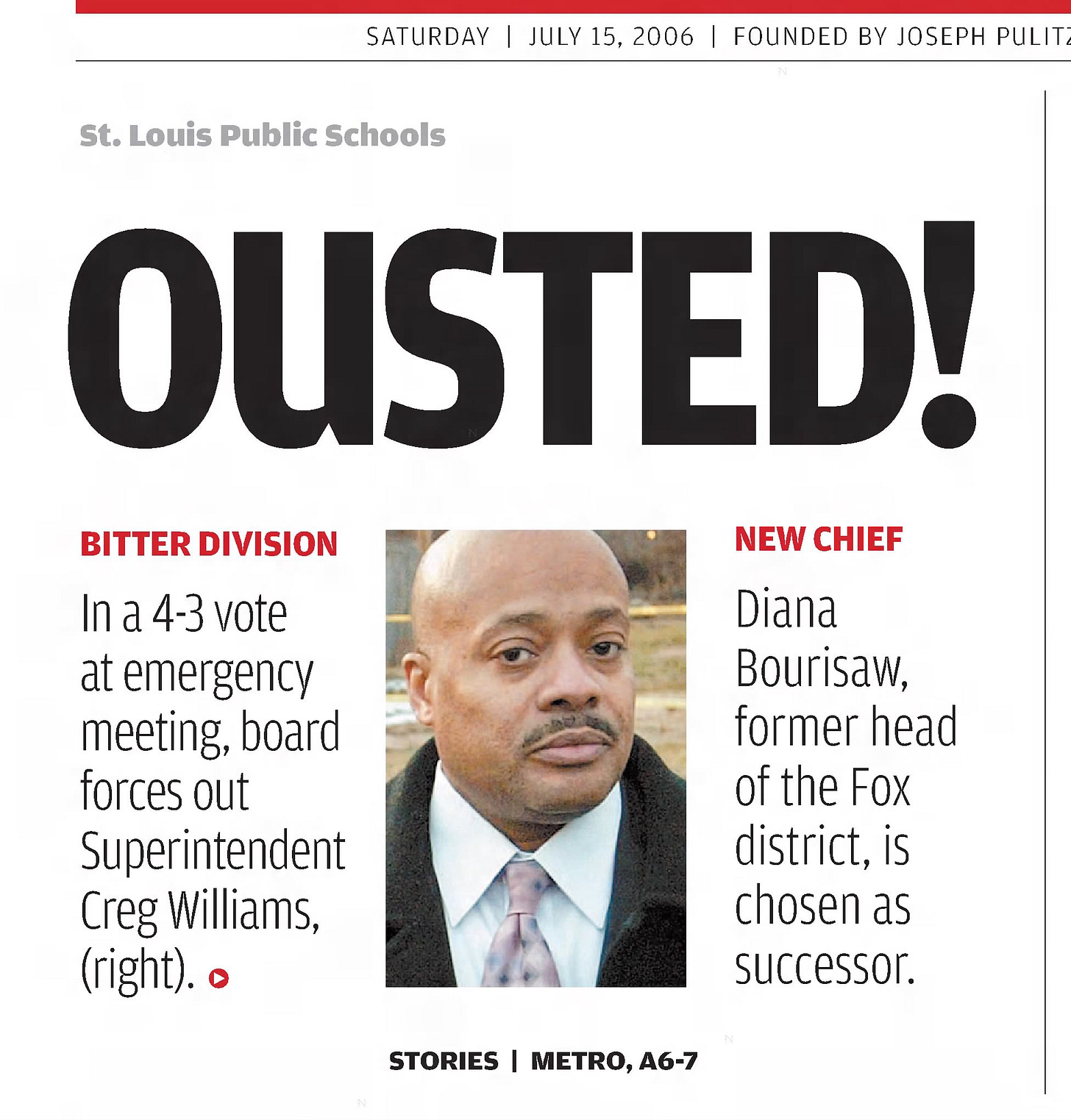To the tipsters and whistleblowers. To the people who lost their jobs and kept going. To the journalists and fact-finders. To the ones who didn’t give up or look the other way. You are the invisible network of heroes that saved this school district. Thank you for not quitting. Thank you for not being silent. Thank you for trusting your gut and following your intuition.
And, as one of those heroes said to me amidst all this chaos - “Moms run the world. Or should.”
To the ones who employed the tropes of angry women scorned. To those who knew what was happening and knew it was wrong yet watched silently as one good person after another was fired. To those who minimized fact and blamed emotion. To those who were warned and chose to stay complicit. Well. You have some self-reflecting to do.
We’re at a weird place right now. Some of us, myself included, feel like we’ve been shouting this from the rooftops forever.
Here are a few of my previous posts on related topics if you’d like to catch up:
The SLPS Consent Agenda: May 2024
Others are just beginning to understand. It’s resulting in poor communication and weird outbursts. But let’s try to remember we’re all humans experiencing feelings as humans. I’ve been following this pattern for months. I thought I’d pre-grieved this chaos. Yet, just like Roman Roy, I was very, very wrong. So, no matter where you fall on the spectrum of emotion — vindication, exhaustion, disbelief, outrage, confusion, sadness — take time to care of yourself and go easy on others.
In a lot of ways, I’m still a 25-year old first year teacher standing at the front of a bare classroom on the first day of school.
Let me explain.
I didn’t go to undergrad with the intention of being a teacher. My plan was to go from chemistry degree to law degree to corporate/patent law (hindsight is wild, isn’t it) but a work study position as a chemistry laboratory assistant changed everything for me.
By the spring of 2006, I was applying and interviewing across the metro area and ended up at a career fair for SLPS. I talked to some schools and principals and then it was crickets until one day, randomly, a contract showed up at my house. It was signed by Superintendent Creg Williams.
A few months later, the school board had voted him out and replaced him with Diana Bourisaw.


I showed up to opening week professional development without having been assigned a school. I called HR. I called and called and called but got little to no response. I sat in 801. I sat and sat and sat but no one could tell me anything. Finally, the day before school started I was assigned to a school. When I showed up hoping to set up my classroom the principal had no idea who I was.
So there I was the next morning, a first year teacher, on the first day of school, standing in front of twenty-ish 8th graders in a bare classroom with zero preparation. The only person I knew at the school was the principal who had absolutely zero to do with hiring me. It was a rough start. Honestly, it was a rough year. But I made it. And near the end of the school year a well-seasoned teacher pulled me aside in the hallway and said: “Rohde-Collins. You’re tough as nails.”
All of you educators out there can fill-in-the-blanks of my story. Of the tears shed in the car to and from school. Of the struggle to find my place in the hierarchy of my school and district. Of the torture of navigating the Central Office bureaucracy to accomplish simple tasks like getting paid or completing PD hours. And how all of that flashed through my mind and heart when I got that compliment from a teacher who’d been doing it a long, long time.
I made it five more years. I wish I could have stuck it out long enough to be that seasoned teacher offering a well-timed compliment to a newbie, but life-stuff landed at the same time my burnout did and I left the classroom.
But this is why I got into education politics. Our school district is rough on the people it needs the most: teachers.
So, when I was in the position to guide the district through the unprecedented transition from the SAB to an elected board, I drew from my own experiences as a first year teacher trying to do what was best for kids every day in a district that was falling apart from the top down. My priority was to make sure the teachers and students didn’t feel a seismic shift and could just come to school everyday to teach and to learn.
That meant progress was slow. Probably even too slow sometimes. I know my approach was not always well-received, but I was trying so hard not to give others the same SLPS battle scars that I had inflicted on me.
Many things are different between then and now. Much has transpired in the years between. Yet, here we are again at the start of another school year with a district that is falling apart. Teachers are worried. Parents are stressed.
Stability is vitally important to a school district, especially one the size of SLPS. Stagnation is dangerous for a school district, especially one in a city where the majority of children live in poverty and struggle to meet academic goals. How do we strike the right balance so our children, our district, and our city can thrive? How do we escape this cycle of turmoil and get the progress we’ve deserved for so long.
We have to get to the root of this corruption. We can’t be satiated by fake accountability. We need a full accounting of what happened:
Who knew (or had reason to know) what was going on?
Who benefited from the corruption? Who covered it up?
What policies were broken or ignored? What policies do we need to implement?
What checks-and-balances exist within district decision-making?
To answer those questions, we’ll need to do more than scrutinize the Superintendent. We’ll also need to scrutinize the Board of Education. Their accountability to us goes far beyond merely hiring and firing the superintendent. And unfortunately, elected officials do not always act in the best interest of those people they represent.
Back in the 1950’s, an SLPS school board member (Dan Schlafly) got an anonymous tip that another school board member was utilizing district employees and resources to do construction and repairs on his home. Dan took that tip seriously and relentlessly pursued justice. He had a lot of resources most of us don’t — he was a wealthy, white man after all — so he could take action most of us can’t, but when asked why he did it he shrugged and said: “Somebody had to do it.”
This case now serves as legal precedence for RSMo 162.631.
Yes, this is exhausting. Yes, the story of SLPS is one of corruption. But there have always been heroes who couldn’t and wouldn’t rest until the truth was brought to light.
Support local journalism and subscribe to the Post-Dispatch. If cost is a barrier, full access is available for free through the St Louis Public Library (scroll to the bottom) to anyone with a library card. You can also donate to the St. Louis AmericanFoundation and/or St Louis Public Radio.
And, if you can, donate to the library so they can continue offering free access to all.




